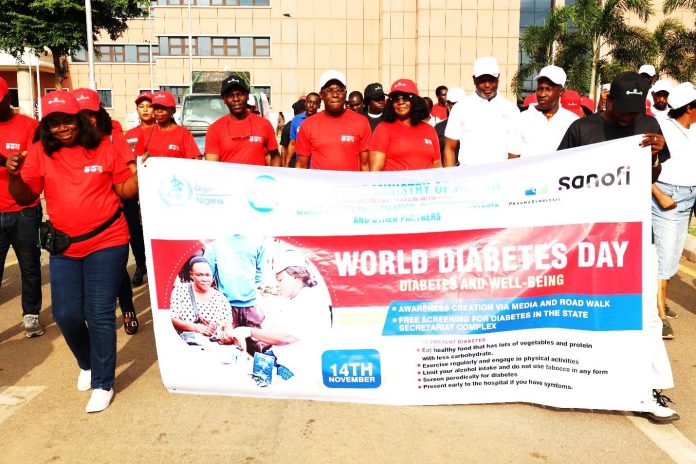BY JUMAI NWACHUKWU /AMAYINDI YAKUBU
The Delta State Ministry of Health, in collaboration with the World Health Organisation (WHO) and other health partners, has held a public sensitisation walk in Asaba while offering free diabetes and hypertension screening to commemorate the 2025 World Diabetes Day.
The event raised alarm over the rising prevalence of diabetes across all age groups. This year’s theme, “Diabetes Across All Ages,” underscores the growing vulnerability of children, adults, and the elderly to the disease.
Representing the Permanent Secretary of the Ministry of Health, the Director of Medical Services, Dr Chris Iwegbu, said the road walk aimed to remind citizens about the dangers of diabetes and the importance of routine blood sugar checks.
“Our activity today is to create awareness. We have gone through the streets to emphasise the need for early diagnosis, timely medical treatment, and continuous follow-up for those already living with diabetes,” he said.
The Delta State Non-Communicable Disease (NCD) Programme Coordinator, Dr Rita Opene, described diabetes as one of the most common yet underestimated NCDs in the state. She warned that many residents fail to take the disease seriously until complications arise.
“If one takes time and manages himself or herself with good social habits, the person will, to a large extent, prevent diabetes,” she said.
Dr Rita also highlighted the financial strain of diabetes management on families, especially given the current economic hardship. She stressed that lifestyle changes remain crucial in preventing and controlling the disease. “Even after becoming diabetic, you still need to exercise, eat right, avoid smoking and drinking for good sugar control,” she said.
She advised residents to watch their portion sizes, eat more fruits and vegetables, increase protein intake, and cut down on excessive carbohydrates. Regular physical activity, she added, significantly improves outcomes.
The State Coordinator of the WHO Delta Field Office, Dr Ibrahim Salisu, expressed concern over the rapid rise of diabetes on the African continent, attributing it to sedentary lifestyles, increasing obesity, and poor access to healthcare services.
“The scale and speed at which cases of diabetes continue to increase are unprecedented. Diabetes spares no one, affecting children, working adults, and the elderly,” he said. Dr Salisu explained that the awareness walk also aimed to promote exercise, a key factor in diabetes prevention. He emphasised the need for early screening for children, women of reproductive age, particularly before and during pregnancy and older adults to avoid complications.
He called for stronger collaboration between government agencies and health partners to strengthen community health systems.
The State Director of the National Orientation Agency (NOA), Mrs Ikolomi Tracy, reaffirmed the agency’s commitment to ongoing health sensitisation campaigns.
“This walk is to let people know they need to know their sugar level and everything about their health,” she said, urging residents to take advantage of free screenings or visit government hospitals for routine checks. She described diabetes as “a silent killer” that becomes manageable when detected early.The Acting Permanent Secretary of the Ministry of Environment, Mr Godwin Enone, linked environmental hygiene and nutrition to diabetes prevention. “A healthy nation is a wealthy nation,” he said.
“When you have a dirty environment and poor eating habits, you are bound to be diabetic.” He noted that many people misinterpret early symptoms due to poor awareness and urged regular hospital visits for simple, accessible diagnostic tests.
All health stakeholders present at the event reiterated that sustained public awareness, lifestyle modification, and early diagnosis are essential to reducing the growing burden of diabetes in Delta State.
Residents were encouraged to embrace healthier habits, undergo regular medical checks, and seek prompt treatment to prevent severe complications.


